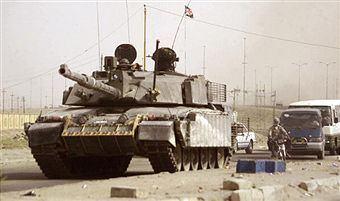 Talk about an own goal. Whatever Air Chief Marshall Sir Simon
Bryant thought he was achieving when he told MPs that the RAF were “running hot” because of the
Libya intervention, the result has been to fuel the debate about the appropriate role of military officers in the public debate – and, in the latest instalment of the debate, if the current
military leadership is actually up to the job.
Talk about an own goal. Whatever Air Chief Marshall Sir Simon
Bryant thought he was achieving when he told MPs that the RAF were “running hot” because of the
Libya intervention, the result has been to fuel the debate about the appropriate role of military officers in the public debate – and, in the latest instalment of the debate, if the current
military leadership is actually up to the job.
It is an important question – nothing should be taboo in a democracy and since Britain has none of the parliamentary oversight that the US congress has over military leaders, this debate is
an important form of scrutiny.
In my experience in Basra and Kabul, many of our military leaders must take part of the blame for Britain’s failure. With an eye to the history books and a nack for tactics, one Helmand
commander after another eschewed strategy and the need to cooperate with the Foreign Office and DfiD to forge a new plan every six months. As a result, to use the criticism of the US war in
Vietnam, Britain fought not one war in Helmand that lasted five years, but 10 wars each lasting six months. Back home, none of the senior leadership took steps to change the UK’s approach or learn
from the past. Instead they complained about their resources, as if the public would ever be able to understand that some 35 billion is not enough for a well-armed military.
But it is too easy to attack the military alone for past failures, though they have at times dominated the decision-making process in to an unhealthy degree. The blame must also fall on the civil
service: the senior officials who ran the FCO, DfiD and the Cabinet Office while Britain struggled in Basra and Helmand. They refused to heed warnings about the campaigns, as detailed in numerous
books of which Mark Etherington’s Revolt on the Tigris is one of the best. When I took over from him in Basra in 2007, little had changed.
These officials, as much as the generals, fought for personal and departmental interests rather than forge the kind of cross-departmental intervention that was required. And rather than be
punished, they rose and rose, ending up either leading their departments or being enobled.
Finally, blame must go the political class. While Labour created the mess, the Tories (and the Lib Dems) may have fluffed the chance to use the SDSR to really revise the way the government plans
and executes its interventions. The one attempt to rectify the situation – the creation of the cross-departmental Stabilisation Unit – has been underpowered and recently brushed aside
as the Libya intervention got under way.
Today, the military is led by a remarkable man. General Sir David Richards is miles away from the caricature of an officer: he is smart, charismatic and able to think strategically. The political
leadership have also begun to change their behaviour with the Prime Minister far more able to tell the military what he wants – even if they don’t like it. In Liam Fox, the MoD finally has a
strong, reform-minded and determined leader.
But the one group that really ought to come in for the criticism, the top officials, have hardly changed at all. Hopefully the Iraq Commission, whose reports cannot be far off, will take aim at
them too.
Daniel Korski
In the firing line | 26 June 2011






Comments